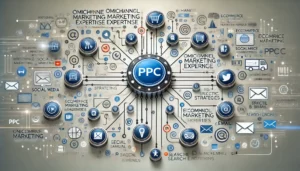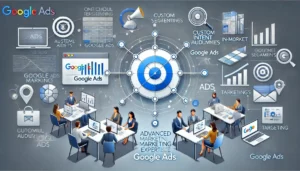Ecommerce PPC Agencies Crafting Cohesive Strategies for UK Brands

To effectively reach and engage modern consumers, UK brands must leverage omnichannel marketing expertise to create seamless customer experiences. This means connecting with customers on lots of different platforms, both online and offline. Ecommerce PPC agencies are experts at creating these kinds of all-in-one strategies. They help brands make sure their messages are clear and consistent everywhere, from Google Ads to social media. This article will show you how these agencies do it and why it’s so important.
Key Takeaways
- Omnichannel marketing connects customers on various platforms, ensuring a seamless experience.
- Ecommerce PPC agencies specialise in creating unified strategies for UK brands.
- Google Ads and social media play a crucial role in omnichannel marketing.
- Data-driven decisions help refine and improve marketing strategies.
- Consistent brand messaging across all channels is key to success.
The Importance of Omnichannel Marketing for UK Brands
Understanding Omnichannel Marketing
Omnichannel marketing is all about creating a seamless customer experience across various platforms. We ensure that our brand’s message is consistent whether our customers interact with us online, in-store, or through social media. This approach helps us meet customer expectations and build stronger relationships.
Benefits of a Cohesive Strategy (Omnichannel Marketing Expertise)
A cohesive omnichannel strategy offers numerous benefits. It allows us to align our messaging and creative assets across all channels, ensuring a unified brand image. By leveraging data analytics, we can understand customer behaviour and preferences better. This enables us to implement real-time personalisation and retargeting, enhancing the customer journey.
- Align messaging across channels
- Utilise data analytics
- Implement real-time personalisation
By meticulously mapping out the customer journey, we can identify key areas for improvement and opportunities to delight our customers. This strategic approach not only increases the likelihood of conversion but also fosters brand loyalty and advocacy.
Challenges in Implementing Omnichannel Marketing
Implementing an omnichannel strategy is not without its challenges. One major hurdle is integrating various touchpoints to create a seamless experience. Additionally, keeping up with technological advancements and changes, such as the discontinuation of expanded text ads by Google Ads in June 2022, requires constant adaptation. We must stay updated to maintain effective marketing campaigns.
- Integrating touchpoints
- Keeping up with technological changes
- Constant adaptation
Omnichannel Marketing Expertise: How Ecommerce PPC Agencies Enhance Omnichannel Strategies
Role of PPC in Omnichannel Marketing
In the world of omnichannel marketing, PPC plays a crucial role. It helps us reach customers at various touchpoints, ensuring a seamless experience. By leveraging PPC, we can target specific audiences with tailored messages, driving engagement and conversions across multiple channels.
Case Studies of Successful Campaigns (Omnichannel Marketing Expertise)
We’ve seen numerous success stories where ecommerce PPC agencies have transformed businesses. For instance, one UK brand saw a 30% increase in sales after integrating PPC into their omnichannel strategy. These case studies highlight the importance of a well-executed PPC campaign in achieving business goals.
Choosing the Right PPC Agency
Selecting the right PPC ecommerce agency is vital for success. We should consider factors like experience, expertise, and customer reviews. It’s also essential to look for agencies that have a proven track record with similar businesses. A good PPC agency can make a significant difference in your marketing efforts.
Partnering with a skilled PPC agency can free up valuable time, allowing businesses to focus on other critical areas.
By understanding the role of PPC in omnichannel marketing, examining successful case studies, and choosing the right agency, we can enhance our marketing strategies and achieve better results.
Omnichannel Marketing Expertise: Crafting a Unified Customer Experience
Integrating Online and Offline Channels
Creating a seamless experience across both online and offline channels is crucial. We need to ensure that our customers can transition smoothly between our website, social media, and physical stores. This means aligning our messaging and creative assets across all platforms. By doing so, we can build a consistent brand image that our customers can trust.
Personalisation in Omnichannel Marketing Expertise
Personalisation is key to making our customers feel valued. By using data analytics, we can understand customer behaviour and preferences. This allows us to tailor our messages and offers to meet their specific needs. Real-time personalisation and retargeting can significantly enhance the customer journey, making each interaction more relevant and engaging.
Ensuring Consistent Brand Messaging
Consistency in brand messaging is essential for building a reliable brand image. We must ensure that our core values and mission are reflected in all our communications. This includes everything from our social media posts to our in-store signage. By maintaining a consistent message, we can foster trust and loyalty among our customers.
By meticulously mapping out the customer journey, we can identify key areas for improvement and opportunities to delight our customers. This strategic approach not only increases the likelihood of conversion but also fosters brand loyalty and advocacy.
Leveraging Google Ads for Omnichannel Success
Advanced Targeting Techniques
In the world of omnichannel marketing, advanced targeting techniques are crucial. Google Ads offers a variety of tools to help us reach our ideal audience. By using features like custom intent audiences and in-market segments, we can ensure our ads are seen by those most likely to convert. This precision targeting helps us maximise our return on investment (ROI) and ensures our marketing efforts are not wasted.
Optimising Ad Spend Across Channels (Omnichannel Marketing Expertise)
Managing ad spend across multiple channels can be challenging. However, with Google Ads, we can allocate our budget more effectively. By analysing performance data, we can identify which channels are delivering the best results and adjust our spending accordingly. This approach not only improves efficiency but also helps us stay within budget while achieving our marketing goals.
Measuring the Impact of Google Ads
To truly understand the effectiveness of our Google Ads campaigns, we need to measure their impact. Tools like Google Analytics and conversion tracking provide valuable insights into customer behaviour and campaign performance. Regular audits and analysis allow us to identify areas for improvement and make data-driven decisions. A thorough Google ads audit can reveal hidden opportunities and inefficiencies, enabling us to refine our strategies for better results.
By leveraging the expertise of Google ads agencies, we can ensure our campaigns are optimised for success. Their knowledge of the platform’s nuances allows us to capitalise on its strengths and drive meaningful engagement with our audience.
The Role of Social Media in Omnichannel Marketing
Building Brand Awareness
In today’s digital world, social media is a powerful tool for building brand awareness. Platforms like Facebook, Instagram, and TikTok allow us to reach a vast audience. By creating engaging content and leveraging influencers, we can amplify our message and make our brand memorable. Consistency in messaging across all social media channels is crucial to maintain a strong brand image.
Engaging with Customers on Multiple Platforms (Omnichannel Marketing Expertise)
Engaging with customers on multiple platforms helps us understand their needs and preferences better. We can use social media to interact with our audience, respond to their queries, and gather feedback. This two-way communication builds trust and loyalty. It’s essential to be active on platforms where our customers spend their time.
Social Media Advertising Strategies
Social media advertising offers targeted and cost-effective ways to reach potential customers. By using advanced targeting options, we can ensure our ads are seen by the right people. A mix of organic and paid strategies can improve our expected CTR and overall results. We should regularly analyse the performance of our ads and adjust our strategies accordingly.
Social media is not just about posting content; it’s about creating a community around our brand. By engaging with our audience and providing value, we can turn followers into loyal customers.
In summary, social media plays a vital role in omnichannel marketing by building brand awareness, engaging with customers, and implementing effective advertising strategies.
Data-Driven Decision Making in Omnichannel Marketing
Collecting and Analysing Customer Data
In the world of omnichannel marketing, data is our best friend. By collecting and analysing customer data, we can understand what works and what doesn’t. This helps us make better decisions and improve our strategies. Data-driven insights allow us to tailor our marketing efforts to meet customer needs more effectively.
Using Analytics to Refine Strategies (Omnichannel Marketing Expertise)
Analytics play a crucial role in refining our marketing strategies. By diving deep into the data, we can identify trends and patterns that inform our decisions. This isn’t about guesswork; it’s about making informed choices that drive performance. For instance, we can tweak our ad campaigns or optimise our website’s user experience based on these insights.
Predictive Modelling for Future Campaigns
Predictive modelling is a powerful tool in our marketing arsenal. By leveraging historical data, we can forecast future trends and customer behaviours. This allows us to stay ahead of the curve and craft campaigns that resonate with our audience. Predictive analytics empower us to not only interpret data but to anticipate trends and user needs, positioning our campaigns a step ahead.
By focusing on data-driven decision making, we’re not just reacting to the market; we’re shaping it. This strategic approach not only increases the likelihood of conversion but also fosters brand loyalty and advocacy.
Omnichannel Marketing Expertise: Optimising Conversion Rates Across Channels
A/B Testing for Better Results
To boost conversion rates, we must embrace A/B testing. This involves comparing two versions of a webpage or ad to see which one performs better. Start by changing one element at a time, like the headline or call-to-action. Small tweaks can lead to big improvements. By continuously testing, we can find the best combination that resonates with our audience.
Enhancing User Experience (Omnichannel Marketing Expertise)
A seamless user experience (UX) is crucial for high conversion rates. Our website should be easy to navigate and quick to load. If visitors can’t find what they need quickly, they’ll leave. We need to ensure our site is both attractive and functional. This means clear menus, logical categories, and a fast checkout process.
By focusing on UX enhancements, we’re not just optimising for conversions; we’re building a foundation of trust and satisfaction that can lead to long-term customer loyalty.
Effective Call-to-Action Techniques
Our calls-to-action (CTAs) should be clear and compelling. Use action-oriented language that tells visitors exactly what to do. For example, instead of “Submit”, use “Get Your Free Quote”. Place CTAs in prominent positions where they are easily seen. By making our CTAs strong and visible, we can guide users towards taking the desired action.
Here’s a quick checklist for effective CTAs:
- Use clear, action-oriented language
- Place CTAs in prominent positions
- Make sure they stand out visually
By following these steps, we can improve our conversion rates and ensure our marketing efforts are successful.
The Future of Omnichannel Marketing
Emerging Trends and Technologies
The future of omnichannel marketing is bright and full of potential. We see a shift towards more personalised and seamless customer experiences. Advanced technologies like AI and machine learning are playing a crucial role in this transformation. These tools help us understand customer behaviour better and tailor our strategies accordingly. Brands that embrace these technologies will stay ahead of the competition.
Adapting to Consumer Behaviour Changes (Omnichannel Marketing Expertise)
Consumer behaviour is constantly evolving, and it’s essential to keep up. We need to be agile and ready to adapt our strategies to meet changing preferences. This means staying informed about the latest trends and being willing to experiment with new approaches. By doing so, we can ensure that our marketing efforts remain effective and relevant.
Preparing for the Future
Preparing for the future involves more than just adopting new technologies. It’s about creating a flexible and resilient marketing strategy that can withstand changes in the market. We should focus on building strong relationships with our customers and providing consistent value. This way, we can navigate any challenges that come our way and continue to thrive in the ever-changing landscape of omnichannel marketing.
By meticulously mapping out the customer journey, you can identify key areas for improvement and opportunities to delight your customers. This strategic approach not only increases the likelihood of conversion but also fosters brand loyalty and advocacy.
Case Studies of UK Brands Excelling in Omnichannel Marketing
Retail Success Stories
In the retail sector, several UK brands have demonstrated the power of omnichannel marketing. For instance, a leading fashion retailer integrated their online and offline channels seamlessly. They used data analytics to understand customer preferences and tailored their marketing messages accordingly. This approach led to a significant increase in both online and in-store sales.
Innovative Campaigns in the Service Industry (Omnichannel Marketing Expertise)
Service-based businesses have also reaped the benefits of omnichannel strategies. A notable example is a UK-based travel agency that utilised social media, email marketing, and PPC campaigns to create a cohesive customer journey. By aligning their messaging across all platforms, they were able to build strong customer relationships and drive sustained growth.
Lessons Learned from Leading Brands
From these case studies, we can draw several key lessons. First, consistency in messaging across all channels is crucial. Second, leveraging data analytics to personalise customer experiences can significantly enhance engagement. Finally, integrating various marketing channels can lead to a more unified and effective strategy.
By meticulously mapping out the customer journey, brands can identify key areas for improvement and opportunities to delight their customers. This strategic approach not only increases the likelihood of conversion but also fosters brand loyalty and advocacy.
Omnichannel Marketing Expertise: Choosing the Right Ecommerce PPC Agency for Your Brand
Key Qualities to Look For
When selecting a PPC agency, it’s essential to consider their expertise. Do they specialise in Google AdWords PPC or social media advertising? Matching their strengths to your needs can significantly boost your campaign’s performance.
Another critical factor is their communication style. Clear and prompt communication ensures that your objectives align with their actions. Regular updates and easy access to your account manager can make a world of difference.
Pricing structure is also vital. Transparent pricing without hidden fees is crucial. Ensure their cost fits your budget and that you understand what you’re paying for, maximising the value of your investment.
Lastly, analyse their strategic approach. A good PPC agency doesn’t just manage your ads; they strategise to improve your overall marketing funnel. They should offer strategies that integrate with your other marketing activities to boost overall effectiveness.
Questions to Ask Potential Agencies
- What is your experience with PPC management for ecommerce brands?
- Can you provide case studies or examples of successful campaigns?
- How do you measure the success of a PPC campaign?
- What is your pricing structure?
- How often will we receive performance reports?
- What tools and technologies do you use for campaign management?
- How do you stay updated with the latest trends in PPC advertising?
Evaluating Past Performance
Evaluating an agency’s past performance is crucial. Look for client testimonials and reviews. Positive feedback from previous clients, especially those in your sector, often predicts your potential satisfaction with their services.
Additionally, consider their track record with PPC audits. A thorough audit can identify opportunities to optimise your ad spend and improve campaign performance. Agencies like PPC Geeks, known for their detailed audits, can provide valuable insights.
Choosing the right PPC agency is crucial for the success of your campaigns. Factors like experience, expertise, pricing, and customer reviews play a significant role in making an informed decision.
In summary, selecting the right PPC agency involves careful consideration of their expertise, communication style, pricing structure, and strategic approach. By asking the right questions and evaluating their past performance, you can find an agency that aligns with your business goals and maximises your ROI.
Measuring Success in Omnichannel Marketing
Key Performance Indicators to Track
To measure the success of our omnichannel marketing efforts, we need to focus on several key performance indicators (KPIs). These KPIs help us understand how well our strategies are working and where we can improve. Some essential KPIs include:
- Conversion Rate: This tells us how many visitors are turning into customers.
- Customer Lifetime Value (CLV): This metric shows the total worth of a customer over the entire relationship.
- Return on Investment (ROI): This helps us see the financial return from our marketing spend.
- Customer Retention Rate: This indicates how well we keep our customers coming back.
By keeping an eye on these KPIs, we can ensure our marketing efforts are on the right track.
Tools for Measuring Cross-Channel Performance
Using the right tools is crucial for measuring performance across different channels. Some popular tools include Google Analytics, HubSpot, and Salesforce. These tools help us gather data from various sources and provide a unified view of our marketing performance. For example, Google Analytics can track user behaviour across our website and social media platforms, giving us insights into what’s working and what’s not.
A thorough PPC audit can reveal hidden opportunities and inefficiencies, allowing for strategic adjustments that enhance performance without inflating costs.
Interpreting Data for Continuous Improvement
Interpreting the data we collect is just as important as gathering it. We need to look for patterns and trends that can inform our future strategies. For instance, if we notice a high bounce rate on a particular landing page, it might be time to rethink the design or content. By meticulously mapping out the customer journey, we can identify key areas for improvement and opportunities to delight our customers.
In summary, measuring success in omnichannel marketing involves tracking the right KPIs, using effective tools, and continuously interpreting data to refine our strategies. This approach not only increases the likelihood of conversion but also fosters brand loyalty and advocacy.
Understanding how to measure success in omnichannel marketing is key to improving your business. By tracking the right metrics, you can see what works and what doesn’t. Want to learn more about how to boost your marketing efforts? Visit our website for a free PPC audit and expert advice.
Conclusion
In the ever-evolving world of eCommerce, UK brands need to stay ahead by adopting omnichannel marketing strategies. PPC agencies play a crucial role in this journey, offering expertise that goes beyond simple ad placements. They help brands create cohesive and engaging customer experiences across multiple platforms. By partnering with a skilled PPC agency, UK brands can ensure their marketing efforts are not only effective but also efficient, driving both customer loyalty and sales. As the digital landscape continues to change, the importance of a well-rounded, omnichannel approach cannot be overstated. It’s not just about being seen; it’s about being remembered and chosen by customers.
Frequently Asked Questions
What is omnichannel marketing?
Omnichannel marketing is a strategy where a brand uses multiple channels to provide a seamless customer experience. This means customers can interact with the brand through different platforms like websites, social media, and physical stores, and still get a consistent experience.
Why is omnichannel marketing important for UK brands?
Omnichannel marketing helps UK brands reach customers on their preferred platforms, making it easier to engage and convert them. It also ensures a consistent brand message and improves customer satisfaction.
How do PPC agencies help with omnichannel marketing?
PPC agencies help by creating targeted ads that appear on various platforms, such as Google, social media, and more. They ensure these ads are consistent with the brand’s message and track their performance across different channels.
What are the benefits of using PPC in an omnichannel strategy?
Using PPC in an omnichannel strategy can increase visibility, drive more traffic to your site, and improve conversion rates. It also allows for precise targeting and better tracking of customer behaviour.
What challenges might brands face with omnichannel marketing?
Brands might face challenges like ensuring consistent messaging across all platforms, integrating data from different channels, and managing the complexity of multiple marketing campaigns.
How can UK brands choose the right PPC agency?
UK brands should look for PPC agencies with experience in their industry, a proven track record of success, and a deep understanding of omnichannel strategies. It’s also important to check client reviews and case studies.
What should be considered when measuring the success of an omnichannel marketing campaign?
When measuring success, consider metrics like customer engagement, conversion rates, and ROI across all channels. It’s also important to track how well different channels are working together to provide a seamless customer experience.
How does personalisation fit into omnichannel marketing?
Personalisation involves tailoring marketing messages and experiences to individual customers based on their behaviour and preferences. In omnichannel marketing, this means providing personalised experiences across all channels to better engage customers and improve satisfaction.
Author
Search Blog
Free PPC Audit
Subscribe to our Newsletter
The Voices of Our Success: Your Words, Our Pride
Don't just take our word for it. With over 100+ five-star reviews, we let our work-and our satisfied clients-speak for us.
"We have been working with PPC Geeks for around 6 months and have found Mark and the team to be very impressive. Having worked with a few companies in this and similar sectors, I rate PPC Geeks as the strongest I have come across. They have taken time to understand our business, our market and competitors and supported us to devise a strategy to generate business. I value the expertise Mark and his team provide and trust them to make the best recommendations for the long-term."
~ Just Go, Alasdair Anderson




